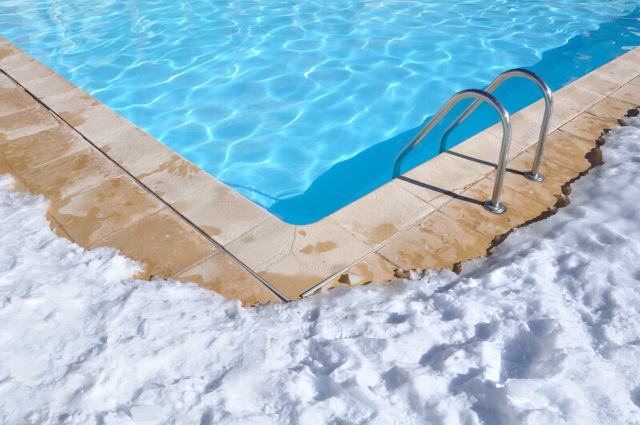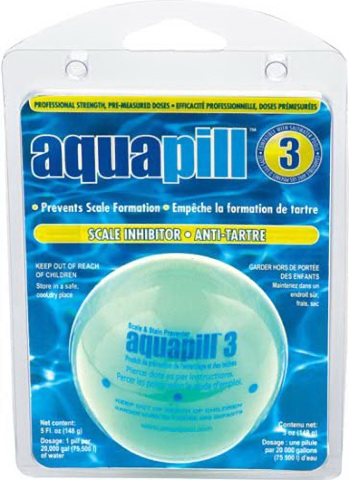It’s one of the saddest times of the year when you close down your pool until next summer. Between now and then, you’ll have to winterize your pool to maintain its condition. Should you use antifreeze when closing your pool?
If you blow out your plumbing lines of water, then antifreeze is not necessary to properly close your pool. Should you feel uncertain that your plumbing lines are clear, are worried about water leaking in or you’d like the extra peace of mind, you’re free to add antifreeze.
In today’s article, we’ll talk about when to apply pool antifreeze when winterizing your swimming pool and how you can safely winterize your pool without any antifreeze at all. Keep reading!

Article Contents
What is Antifreeze for the Pool?
Antifreeze is an additive that reduces a water-based liquid’s freezing point. In other words, when you pour antifreeze through your pool system, the water’s freezing temperature is lower so the water may not freeze.
Should You Use Antifreeze? Will Your Pool Freeze?
If you live in a climate where everything freezes and you don’t blow out your pipes (lines), always use antifreeze. If you have freezing winters and you do blow out your pipes, you may not need antifreeze. In either case, make sure you protect your skimmer by using a gizmo and antifreeze.
How Much Antifreeze Do You Need for Pools?
If you decide to use antifreeze in your swimming pool, you need a gallon per every 10 feet of pool piping if the pipes are 1.5 inches in diameter. This usage rule only applies to pipes that are full of water.
For pipes that are half-full, you can cut down on the quantity of antifreeze. If your pipes are emptier still, then reduce your quantity further.
What if your pool pipes have no water in them? Then you shouldn’t have to use antifreeze in the first place.
Remember, antifreeze prevents the pool water from freezing. Without any pool water in the plumbing system, then its application is a moot point.
What Happens if You Don’t Use Antifreeze?
Antifreeze is suggested for in-ground pools with underground pipes. But is not required for closing your pool. It serves as added insurance against colder weather or if you haven’t properly removed all the water from your pipes.
It’s a choice only you can make based on your comfort level with removing water from your lines and the weather in your area. Just remember that repairs to cracked pipes can be very expensive and cost you time in your pool while you’re waiting for repairs!
What Kind of Antifreeze Should You Use for a Pool?
The best type of antifreeze for swimming pools is swimming pool antifreeze. You can also use RV antifreeze, it’s the same. The formula is non-toxic so you don’t have to worry about what would happen if some antifreeze got in your pool when your family or friends were still swimming in it.
RV or swimming pool antifreeze can prevent water from freezing down to -40 degrees Fahrenheit (-40°F), which is quite impressive!
The main ingredient in RV antifreeze is propylene glycol. This compound, unlike ethylene glycol, is not highly toxic.
Ethylene glycol, which is what automotive antifreeze contains, as we’ve discussed on the blog before, is highly toxic if ingested. It should not be used in swimming pools or water features. In the most severe cases, lead to kidney, lung, and heart damage.
Propylene glycol antifreeze (pool or RV antifreeze) comes in a variety of colors, so you can’t always assume that blue or pink antifreeze is what you need. Read the label and confirm that the ingredients list has no ethylene glycol before you complete your purchase.
As an aside, although propylene glycol-based antifreeze shouldn’t cause harm to people, the same is not true of pets. Keep your cats, dogs, and other animals away from your pool after you add antifreeze.
Closing a Pool Without Antifreeze
As we touched on in the intro, if you hope to close your swimming pool without antifreeze, then you must blow out the pool lines. Here’s how you do that.
Choose How You’ll Blow Out the Pool Lines
Although it sounds scary and a little dangerous, blowing out the pool lines simply means forcing all the water out of your pool pipes using air.
Some swimming pool owners use a shop vac, air compressor, or even a leaf blower. Leaf blowers, even though you would think they would, don’t really work well for this application.
Shop vacs with a 5-horsepower engine are suitable, but anything lower than that can get overwhelmed by the resistance of water in the pipes.
Air compressors are perfect for this. You’ll only need a small 3-gallon compressor to blow out the lines.
The best tool is a pool liner blower. Unlike a leaf blower, a pool liner blower is designed for just that, blowing out your pool lines. However, they can be pricey.
Reduce the Pool Water Levels
If you haven’t already started draining your pool water, that’s the next step. The water line should be between four and 12 inches under the skimmer.
Adjust the Multiport Valve
Once the water is down to the desired levels, change your multiport valve mode to the filter or recirculate positions. If you want to know more about multiport valve mode or settings, check our article on What Do All the Multiport Valve Pool Filters Settings Do?
Attach the Pool Line Blower to the Skimmer
With your pool line blower, you’ll need a hose that’s between three and six inches long. You’ll also require a 1.5-inch adapter for attaching the skimmer to the hose.
If your skimmer has dual holes at the bottom, then slot the hose adapter into one of those holes. Then connect the hose to the adapter, and you’re ready to begin using your pool line blower.
Blow Out the Pipes
Begin with the suction side and then move on to the pressure side. When you blow the pipes, you have to be extremely careful. Over-applying pressure to the pipes could cause them to rupture, which would be quite a costly mistake to make at the end of the pool season.
You don’t have to blow out pool pipes on your own if you’re not comfortable. You can always call a pro for the job.
Once you’ve adequately blown out the water in your pipes, you can continue with pool winterization as usual. Take out all the pool accessories such as the diving board, safety ropes, railing, and ladders. Then put your cover on.
Are Pool Winterizing Chemicals Necessary?
As we’ve established, antifreeze is optional when closing your pool if you drain your pipes. (We’ll tell you more on how to do that in the next section.)
What about other pool chemicals though? Can you shut down your pool for the winter with no chemicals at all?
Technically, yes. That said, the chemicals we’re about to recommend will ensure a cleaner pool so you have a lot less work to do when you reopen your pool.
Scale and Stain Preventative
A scale and stain preventative will avert unwanted stains from mineral accumulations or metal.
You should apply the preventative before you reduce the water level in your pool and with the filter pump is still connected. Most scale and stain preventatives need to disperse throughout the swimming pool to work properly.
For a mess-free application, try the AquaPill 3. For every 20,000 gallons of water, you drop in one AquaPill. Over time, the AquaPill will release chemicals that inhibit stains and scale without you having to do a thing.

Chlorine-Free Pool Shock
Shocking your pool one last time for the season is a smart move.
What some swimming pool owners don’t realize is that you don’t need to use as much chlorine during this last pool shock of the year as you would when you first open the pool for the summer season. This is because the water temperature is low and the lower the temp, the less bacterial growth.
A chlorine-free pool shock is perfectly suitable. The lack of chlorine still oxidizes your pool water to reduce contaminants, but you won’t have to worry about wrecking your pool cover.
In the Swim has an entire pool winterizing chemicals kit with chlorine-free pool shock.
Winter Algaecide
Algae don’t stop even in the freezing cold temperatures. To combat algae all winter long, you should invest in a winter algaecide.
BioGuard Algicide 28-40 operates at 40-percent strength compared to a regular algaecide, which is fine for wintertime use. The algaecide shouldn’t leave any residue either.
Conclusion
Antifreeze is not necessary for closing your pool if you blow out your pool pipes first. You can always add some RV antifreeze to the lines just for your personal assurance, but if the pipes are devoid of water, feel free to skip this step! You may check our article Is RV Antifreeze OK for a Swimming Pool? (Answered!), for more information on RV antifreeze.




